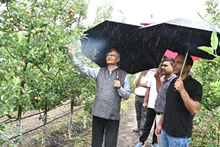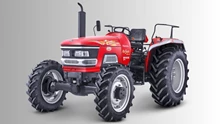
Today, information is readily accessible at the click of a button! From purchasing seeds to gathering insights on the latest farming techniques, the web offers a plethora of resources for farmers and agricultural enthusiasts alike. But among all the genuine agricultural websites, many fraudulent ones take advantage of farmers. Hence, it's essential to learn how to differentiate between authentic Agri websites and their fake equivalents. Read On.
Check the Domain Name:
The domain name serves as the digital address of a website. Legitimate agricultural websites typically have domain names that are relevant to their content and easy to remember. Beware of websites with domain names that include random letters, numbers, or misspellings of popular agricultural brands. These are common tactics used by fake websites to deceive visitors.
Evaluate Website Design and Layout:
Legitimate agricultural websites invest time and resources into creating user-friendly interfaces that prioritize functionality and accessibility. Pay attention to the overall design and layout of the website. Genuine sites tend to have well-organized content, clear navigation menus, and professional aesthetics. Conversely, fake agricultural websites often appear hastily constructed, with poor-quality images, excessive advertisements, and an overall unpolished appearance.
Check for Contact Information & Company Details:
Real agri websites prioritize transparency and provide comprehensive information about the company or organization behind the platform. Look for contact information such as a physical address, phone number, and email address. Additionally, legitimate websites often feature an "About Us" section that outlines the company’s history, mission, and values. If a website lacks this vital information or only provides vague details, proceed with caution.
Review Content Quality & Accuracy:
The credibility of an agricultural website can be evaluated by the quality and accuracy of its content. Legitimate platforms publish informative articles, research papers, and instructional guides written by experts in the field. Be wary of websites that feature poorly written content, grammatical errors, or plagiarized material. Additionally, verify the accuracy of the information presented by cross-referencing with reputable sources or consulting agricultural professionals.
Examine Product Listings & Pricing:
Agricultural websites often sell products such as seeds, fertilizers, equipment, and livestock. Before making any purchases, carefully examine the product listings and pricing information. Legitimate websites display clear product descriptions, images, and pricing details. Beware of websites that offer products at significantly lower prices than their competitors, as this could be indicative of fake or substandard goods.
Check for Secure Payment Options:
When conducting transactions on agricultural websites, prioritize security to protect your personal and financial information. Legitimate websites employ secure payment gateways and encryption protocols to safeguard sensitive data. Look for indicators such as HTTPS encryption in the website’s URL and trusted payment methods. Avoid websites that only accept unconventional payment methods or lack secure checkout processes.
Read User Reviews and Testimonials:
User reviews and testimonials can provide valuable insights into the reputation and reliability of an agricultural website. Genuine platforms often feature authentic reviews from satisfied customers, which serve as social proof of their credibility. However, be cautious of websites with overwhelmingly positive reviews or suspiciously vague testimonials, as these could be fabricated to deceive visitors.
Verify SSL Certificate and Security Measures:
Secure Socket Layer (SSL) certificates encrypt data transmitted between the website and its visitors, ensuring confidentiality and integrity. Legitimate agricultural websites typically have SSL certificates installed, which is indicated by a padlock icon in the browser’s address bar. Additionally, reputable websites implement other security measures such as firewalls, antivirus software, and regular security audits to protect against cyber threats.
Overall caution and discernment are needed when navigating the agricultural websites. By applying the strategies, you can effectively distinguish and select the right one. Remember to prioritize security, accuracy, and transparency when engaging with online agricultural resources!












